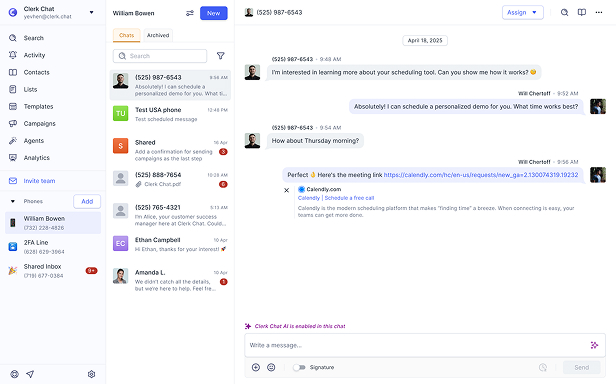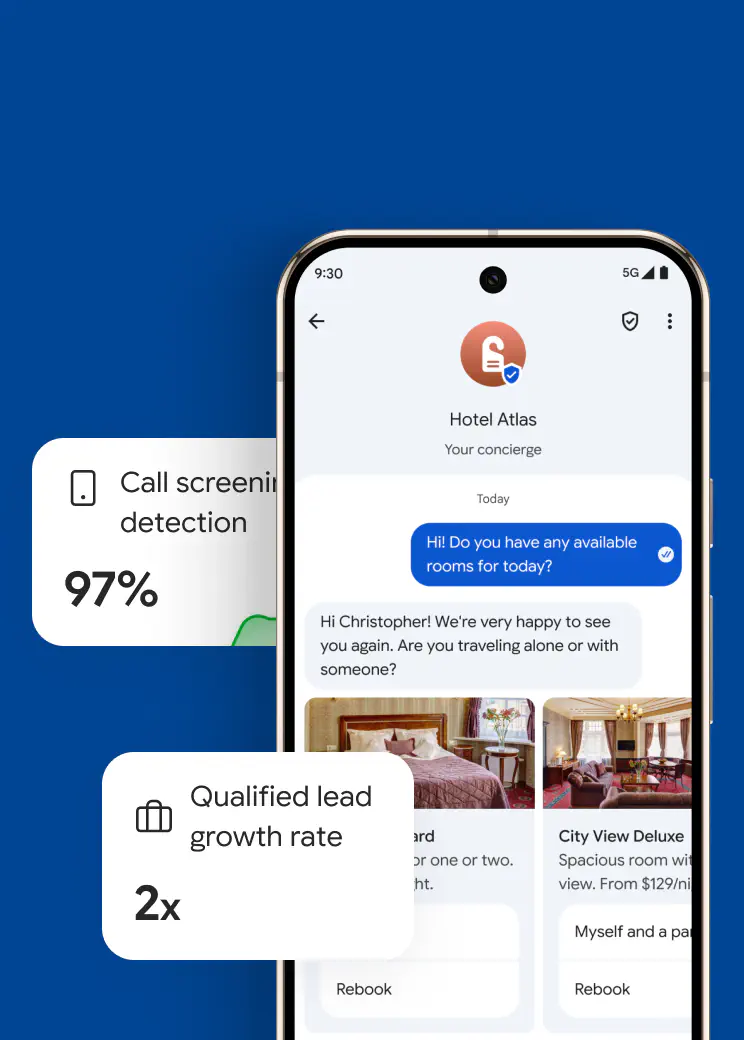Why Your Business Needs AI for Better Customer Experience
By William Bowen
- Published: January 31, 2025
The growing potential of AI for customer experience is difficult to ignore. According to IBM, 74% of executives now say that AI will fundamentally change how they handle interactions with customers. That percentage will only continue to grow as companies discover new ways to leverage innovative AI solutions, such as generative and conversational AI apps.
More than just an incredible tool for delivering 24/7 support, AI customer experience tools can save customer-facing teams time and money, enhance creativity and productivity, boost workplace efficiency, and even increase conversion and retention rates.
Here, we’ll introduce you to the evolving power of AI-powered tools, the impact they’re having on customer experiences, and the hurdles you’ll need to overcome when embedding AI into your CX strategy going forward.
In this article:
The Rise of AI in Customer Service
Many companies have been using AI in customer experience workflows for some time now. Innovative companies have used AI for data analytics, or to automate tasks, like scheduling and sending business messages to customers at scale.
However, artificial intelligence has grown increasingly versatile and powerful in recent years. We’ve moved from chatbots to conversational AI assistants that can understand natural human language, as well as customer sentiment and intent.
We even have powerful generative AI tools that can automatically create scripts for sales teams, articles and step-by-step guides for customers, and onboarding documents for new employees.
From embracing predictive analytics for proactive service, to enabling hyper-personalization at scale, AI technology is transforming every facet of the customer journey. It’s increasing satisfaction rates and loyalty, reducing churn, and making teams more efficient in their roles.
Don't just read about the future of customer experience – experience it! Schedule a demo to ask questions Clerk Chat's AI and how it can be customized for your business.
How AI Can Improve Customer Experience: Applications
As new types of artificial intelligence for customer service and “experience-focused” teams continue to emerge, the use cases for businesses are evolving. We’re still just scratching the surface of what AI can do to support, delight, engage, and convert customers.
Here are just some examples of how AI can improve customer experiences.
1. Generative AI in Customer Experience: Content Creation
A great customer experience relies on more than just incredible customer service. To really impress, convert, and retain customers, companies need to engage and support them throughout each stage of the customer journey. Generative AI tools are incredible at this.
With generative AI tools like ChatGPT, companies can create high-quality content, from how-to guides, to product reviews and articles faster than ever before.
They can design onboarding and educational resources for customers, helping them to embrace new tools and technologies, or troubleshoot common issues. Companies can even use generative AI to create knowledge base guides and resources for sales, marketing, and support teams.
You can even integrate generative AI bots into existing business tools used for customer-facing interactions. For instance, an AI system built into a conversational messaging app on a website can answer customer questions about products or help guide them towards the right purchase.
AI tools can even help companies create more compelling content for their conversational marketing campaigns, like buyer guides and product quizzes.
2. Enabling Omnichannel 24/7 Engagement and Support
One of the best ways to use AI for customer experience is to leverage the technology to scale your customer communication strategy. With conversational AI for retail, ecommerce, and countless other companies, companies can create bots that are available to help customers 24/7.
Conversational AI agents, unlike standard chatbots, can deliver natural, human-like responses to customers at any time of the day or night – even when human agents aren’t available. For instance, H&M, one of the world’s leading retail giants, uses chatbots on its website to answer customer questions about everything from sizing options, to return policies.
Innovative AI solutions can even interact with customers across various channels. For instance, you could embed an AI bot into your SMS workflows, social media apps, and website chat apps.
Not only does AI in customer service automatically improve service response time, reducing customer frustrations and boosting loyalty, but it can make customer support teams more effective too.
For instance, with an automated messaging service, agents can delegate common or mundane queries to bots, so they have more time to focus on complex customer challenges and requests. Plus, while they’re interacting with customers, employees can access guidance from virtual assistants that can surface insights from CRM and knowledgebase platforms, or suggest potential responses.
3. Enhancing Operational Efficiency with Automation
We’ve already mentioned one of the ways AI customer experience tools can improve operational efficiency. AI bots are excellent at handling common support requests, with automatic text response workflows. But these tools can transform productivity and team performance in other ways too.
For instance, sales teams can use AI lead follow up tools to nurture and connect with customers over time, gradually guiding them towards a specific product or service. Marketing teams can use AI to generate marketing copy or convert marketing materials into different formats or languages.
Business leaders can even use AI tools to transcribe and summarize conversations with customers, gaining valuable insights into purchasing trends, buyer behaviors and more.


Plus, AI-powered tools can help “triage” conversations for various customer-facing employees. For instance, if a customer reaches out to a healthcare company, an AI IVR system could identify their specific needs and rapidly route them to the right department or team member.
With all of these capabilities, AI tools for customer support, sales, marketing, and leadership teams make companies more efficient, productive, and profitable.
4. Enabling Predictive Analytics and Personalization
As mentioned above, many companies have been using AI for customer experience insights for a while now. AI tools can analyze huge volumes of data much faster than human beings. However, they don’t just offer an opportunity to identify performance metrics and trends.
With conversational AI, companies can identify the “sentiment” of customers throughout interactions and purchasing journeys. For instance, a company using conversational AI for sales teams could leverage a bot to immediately identify when customers are happy, frustrated, or sad.
This makes it easier for sales teams to rapidly adapt their strategy, to minimize the risk of churn or avoid using a sale. AI tools can also combine insights from multiple types of historical data, to predict future customer needs, expectations, and actions.
This can help companies develop better customer service staffing strategies, based on potential peaks in demand. It can also help them create more personalized and powerful marketing or sales strategies that actively boost conversion rates and loyalty.
For instance, Starbucks uses AI in its “Deep Brew” technology to identify the specific preferences of customers and create personalized marketing messages for each customer.
5. Increasing Customer Retention and Loyalty
In-depth insights collected by AI tools go beyond simply improving marketing, sales, and customer service strategies. They can help businesses to minimize churn, boost retention rates, and increase long-term customer engagement.
For instance, a company using conversational AI in financial services could use AI to identify the customers most likely to be at risk of churn, based on negative sentiment readings, poor reviews, and dropping engagement levels.
That company could then use generative and conversational AI tools to create personalized marketing campaigns intended to re-engage those customers. For instance, they might offer them access to a free consultation, a discount on their next purchase, or early access to a new product.
Using sentiment analysis tools can also help businesses analyze customer feedback and reviews more effectively, so they can better understand what kinds of issues are most likely to harm customer loyalty. This enables brands to take a proactive approach to retaining buyers.
6. Improving Sales and Revenue
Using AI for customer experience enhancements can improve sales and revenue in numerous ways. As mentioned above, AI tools can help businesses create more personalized marketing, sales, and customer service campaigns, which drive customer loyalty and encourage more purchases.
AI tools can also enhance customer engagement, and reduce the risk of “abandoned carts” in a retail setting. For instance, if a customer leaves an ecommerce website without making a purchase, an AI tool could identify that user, then send an enterprise SMS message automatically, encouraging them to come back and complete the transaction with a custom offer.
Plus, using historical data, predictive analytics, and real-time insights into sentiment, AI bots can identify the best time to upsell or cross-sell customers. An intelligent tool can rapidly identify the best deals or offers to show a customer that could encourage them to spend more during each purchase.
They can also determine the best time to send a message to a customer and the best channel to use, such as SMS, WhatsApp, or online chat.
7. Improving Workforce Management
Finally, leveraging AI customer experience tools can help businesses make the most out of their human resources too. Built into workforce management tools, AI solutions can help business leaders to forecast staffing needs and assign more effective schedules to team members.
For example, Zendesk’s workforce management solution uses AI-powered forecasting to generate possible staffing forecasts based on both customer behavior and historical data. It also gives companies access to automatic agent scheduling tools and real-time tracking, so they can see whether agents are adhering to suggested workflows.
Some AI tools can even monitor common workflows for signs of inefficiencies, to give businesses insights into tasks they can automate or streamline. For instance, you might find that enabling AI, like the Clerk Chat assistant, into your SMS strategy for customer service saves your employees more time on crafting messages and dealing with common issues.
Don't just read about the future of customer experience – experience it! Schedule a demo to ask questions Clerk Chat's AI and how it can be customized for your business.
Ethical Considerations and Privacy Concerns
In every industry, aligning AI and customer experience can deliver exceptional results – from happier customers to more efficient teams. But there are still risks to consider. First, there’s the issue of compliance to think about. In every industry, companies have rules they need to follow when they’re collecting, storing, and using customer data.
If you’re using AI in healthcare marketing, you’ll need to ensure you’re adhering to guidelines like HIPAA. Alternatively, companies using conversational AI for insurance agents or financial advisors will need to consider rules set by the SEC and FINRA.
Then there are far-reaching compliance considerations to think about too – like ensuring you get permission to contact customers with bots on various channels - to adhere to CANSPAM rules.
Beyond that, businesses will also need to think about:
Balancing Personalization and Privacy
AI is excellent for boosting personalization in conversational commerce strategies, marketing campaigns, and even customer service. However, personalizing interactions with customers means accessing sensitive data. Today’s customers are more careful about protecting their information, and they expect companies to be transparent about how information about them is used.
You’ll need to make sure you’re clear with your customers about how you’re using their data to send them relevant offers and deals. Plus, you’ll need to give them the option to ask for their data to be removed from your system to adhere to regulations like GDPR.
Managing AI Ethics
Ethical AI practices are essential for any company investing in AI for customer experience. You’ll need to ensure you’re conducting regular audits of your systems to ensure that they’re not showing signs of bias or discrimination against customers, based on limited data sets.
You’ll also need to be careful about ensuring the AI content you generate doesn’t cause issues linked to plagiarism, or accidentally misinform your customers. Careful governance and due diligence strategies will be crucial to protecting your brand’s reputation and relationships with customers.
The Future of AI in Customer Experience
The use of AI for customer experience is evolving. In the years ahead, we’ll continue to see AI solutions becoming more sophisticated and advanced. At the same time, the focus on privacy, data security, and ethics will continue to grow.
Some of the major trends companies will need to prepare for include:
- Emotion AI: Soon, AI will be able to understand a lot more than just text, sound, and images. Already, advancements in sentiment analysis and understanding are paving the way for a new era of “emotion AI” – intelligent tools that can truly understand what people feel. This will lead to a future where bots can deliver more empathetic experiences to customers.
- AI in immersive experiences: With evolutions in extended reality, AI can help businesses to create more immersive customer experiences. Already, companies are experimenting with AI tools that allow users to try on clothes and makeup digitally with AI-powered AR apps and virtual reality dressing rooms.
- Autonomous AI: Autonomous, or agentic AI, tools are also becoming increasingly commonplace. These solutions can handle multiple stages of a customer journey without human input, making decisions, completing transactions, and so much more.
- Quantum computing: As quantum computing continues to evolve, the speed at which AI tools will be able to process data, make predictions, and deliver insights will accelerate. This will lead to new opportunities for real-time personalization and guidance.
- Ethical and transparent AI: As AI becomes more sophisticated and “human,” companies will need to focus more on ethics and transparency. Customers will want to know how companies are using their data to train AI systems and deliver unique experiences.
On top of that, AI will become more accessible to companies in the years ahead, thanks to evolving integration options with existing toolkits, no-code bot builders and customization strategies.
Embrace the Era of AI Customer Experience with Clerk Chat
Artificial intelligence is no longer the sci-fi technology of the future for customer experience-focused teams. AI and customer experience are becoming increasingly intertwined, and companies need to be ready to embrace the latest tech to adapt to evolving consumer expectations.
Clerk Chat is one of the top innovators in the world today making it easier for companies to embrace the benefits of AI for customer experience. With our business messaging platform, organizations can generate AI text messages in an instant, personalized to the needs of specific customers.
Teams can create omnichannel campaigns to engage, nurture, convert, or support their target audience. They can even use AI to dive deeper into customer sentiment, draw insights from analytics, and make stronger decisions for business growth.
Plus, with our Clerk Chat AI 2-way messaging service, companies can ensure every customer has access to 24/7 guidance.
Discover how you can improve customer interactions, increase sales, boost team productivity, and reduce operational costs with Clerk Chat today.
Will’s latest superpower is building innovative AI solutions to add value for clients. He's passionate about all things AI, entrepreneurship, and enjoys staying active with sports and outdoor activities.
In this article:
Ready to use your business number for text messaging?
Thousands of businesses are already experiencing the power of conversational messaging through SMS. Join us. Free trial and paid tiers available.
Get Started#Subscribe
Get product updates in your inbox
Tutorials, features, and Clerk Chat news delivered straight to you.



